Diary of Trooper Ion Llewellyn Idriess-1917-1918 - Part 7
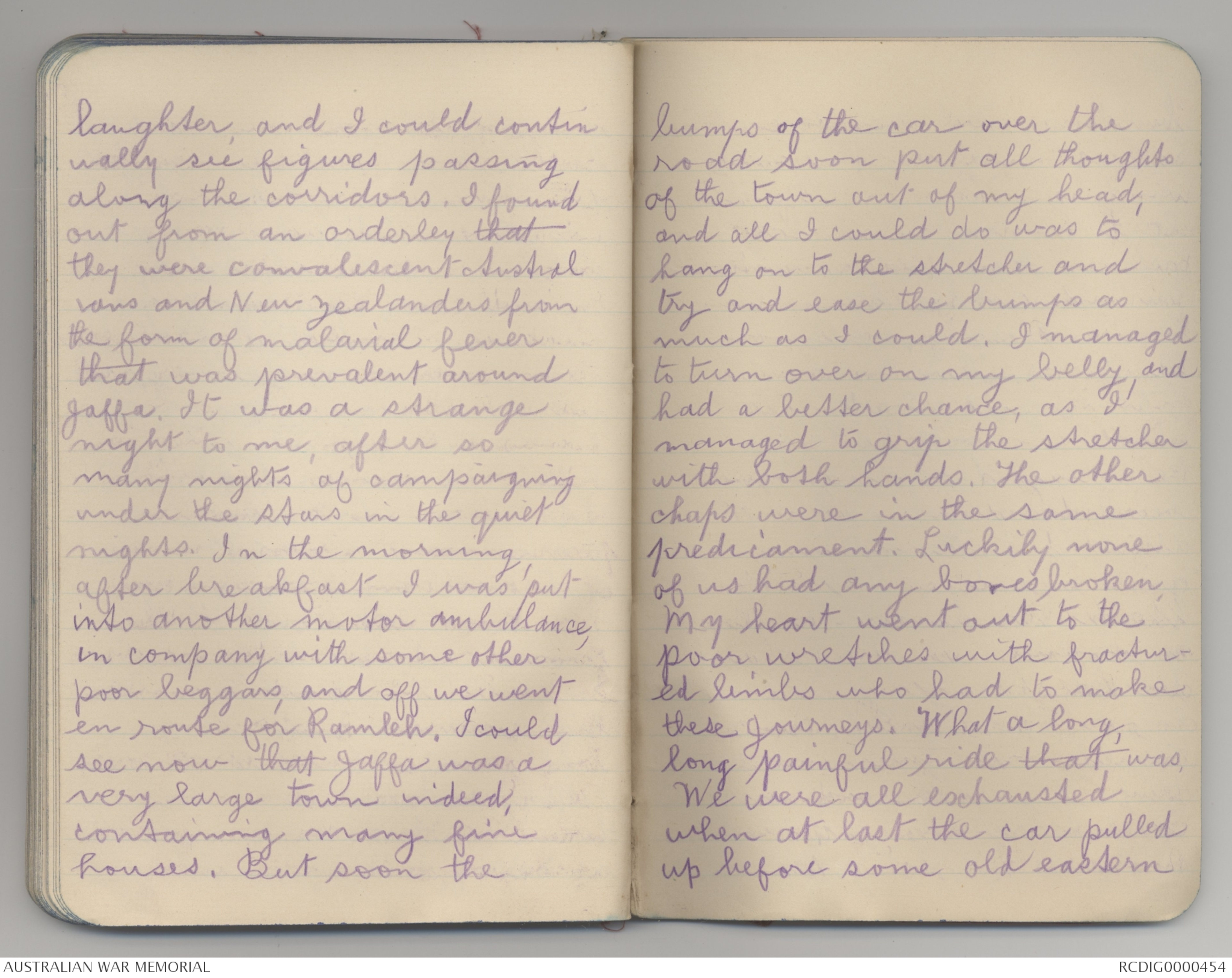
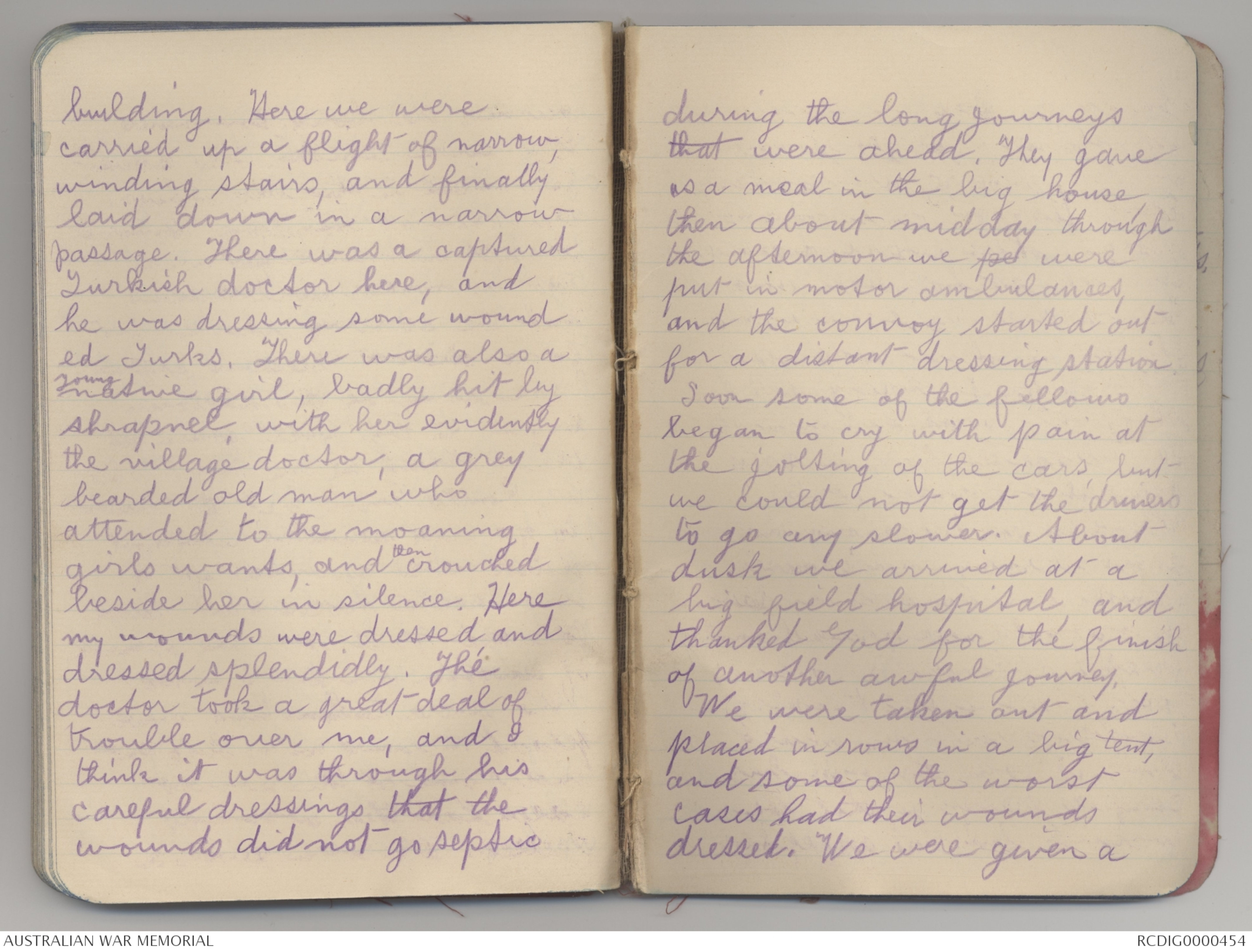
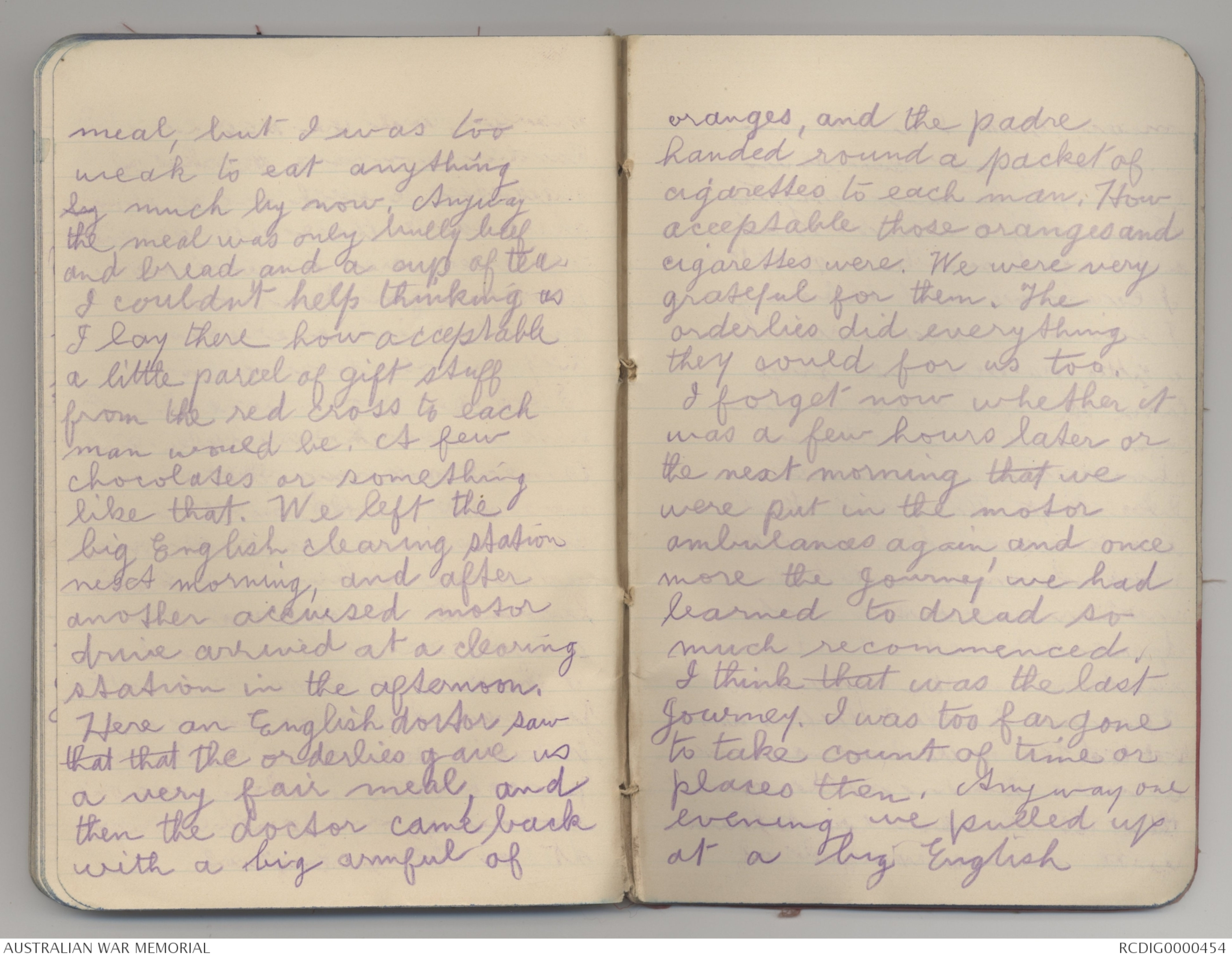
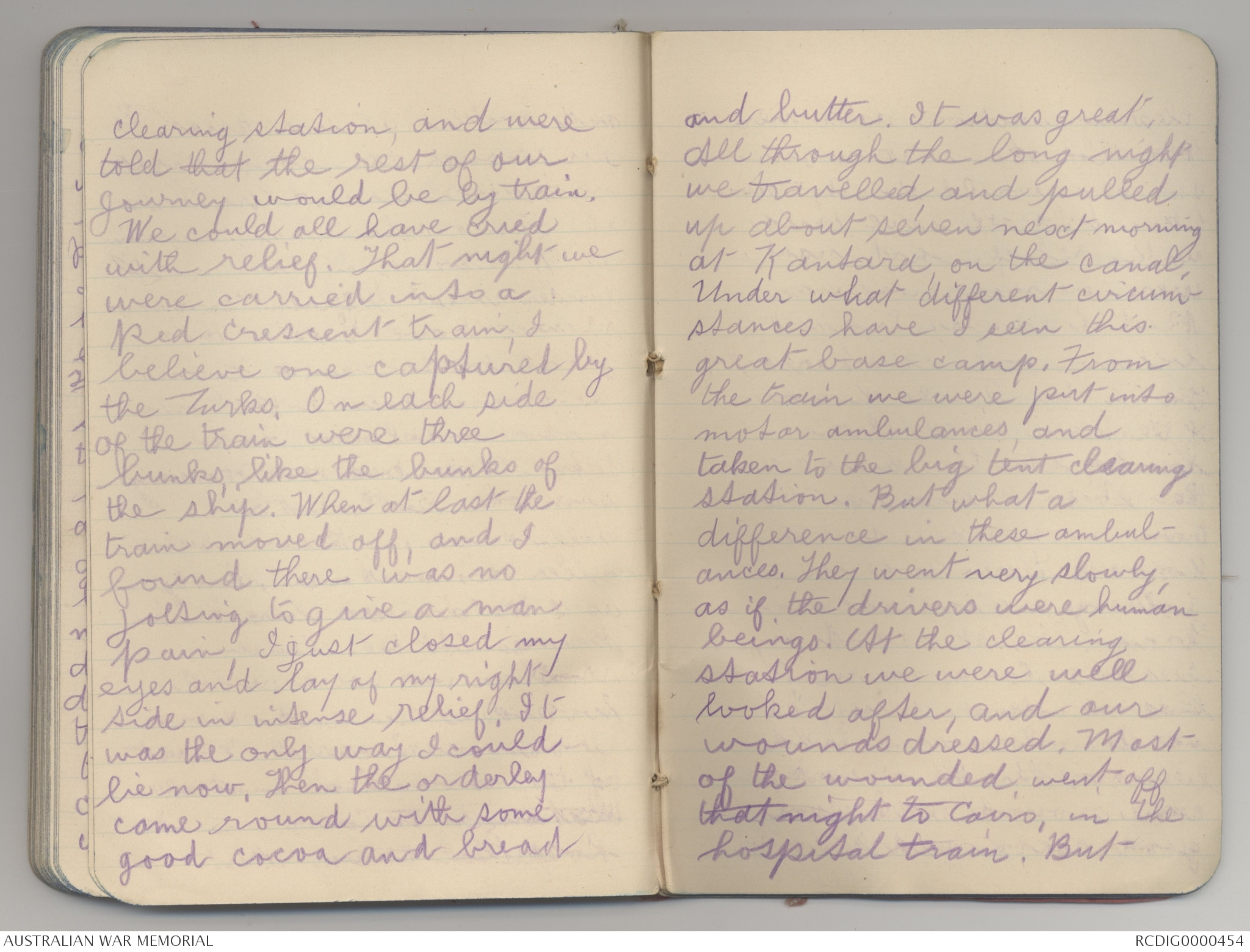
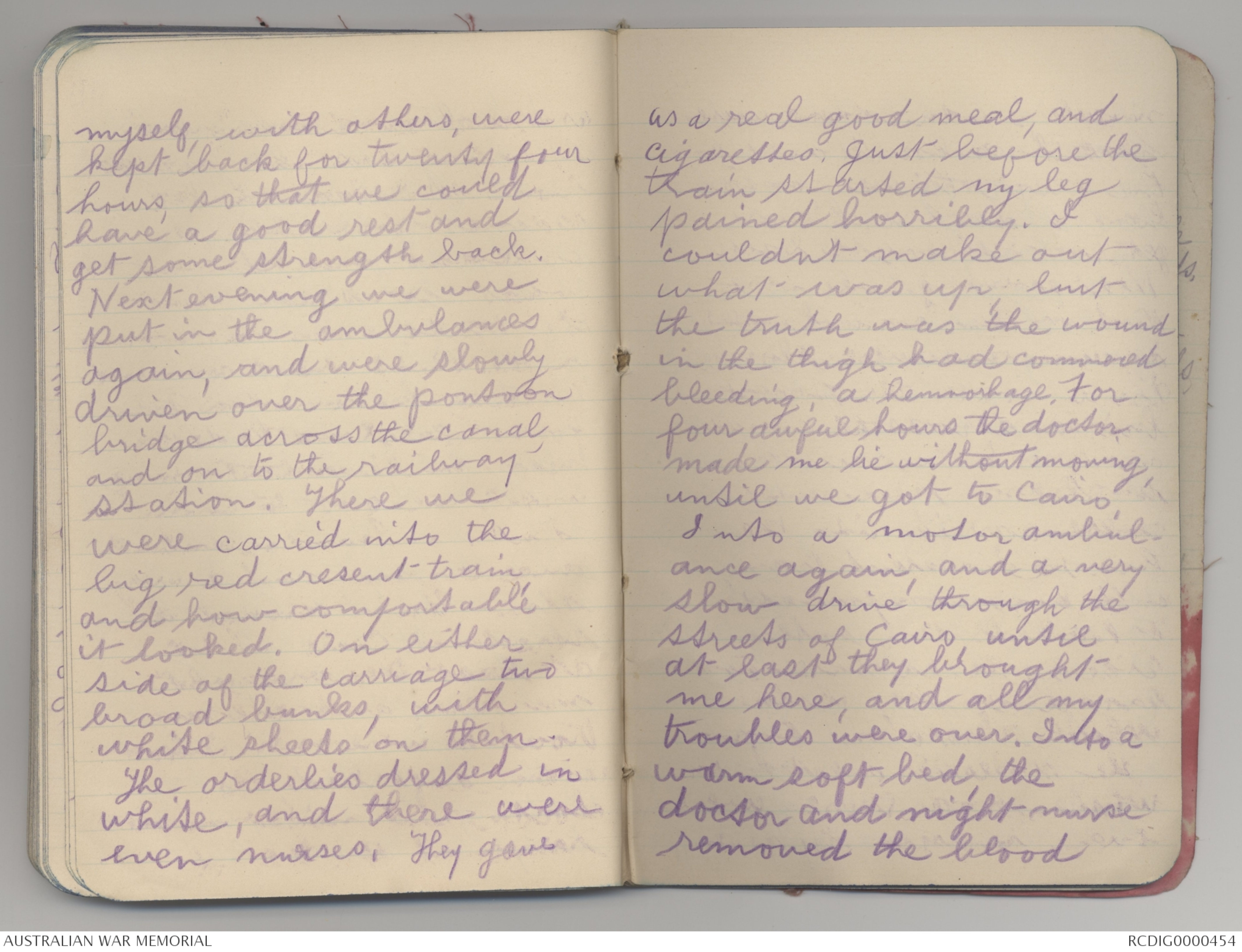
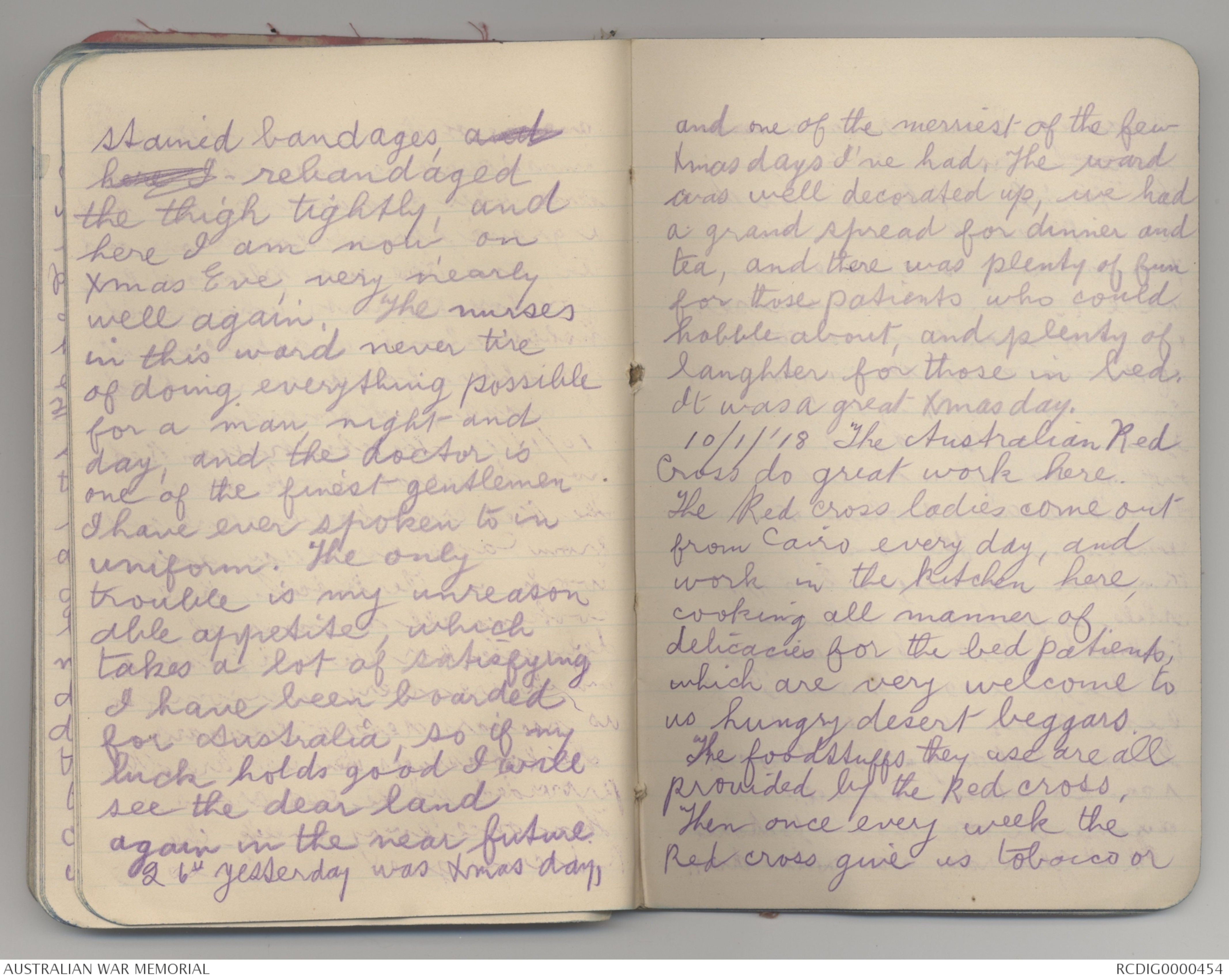
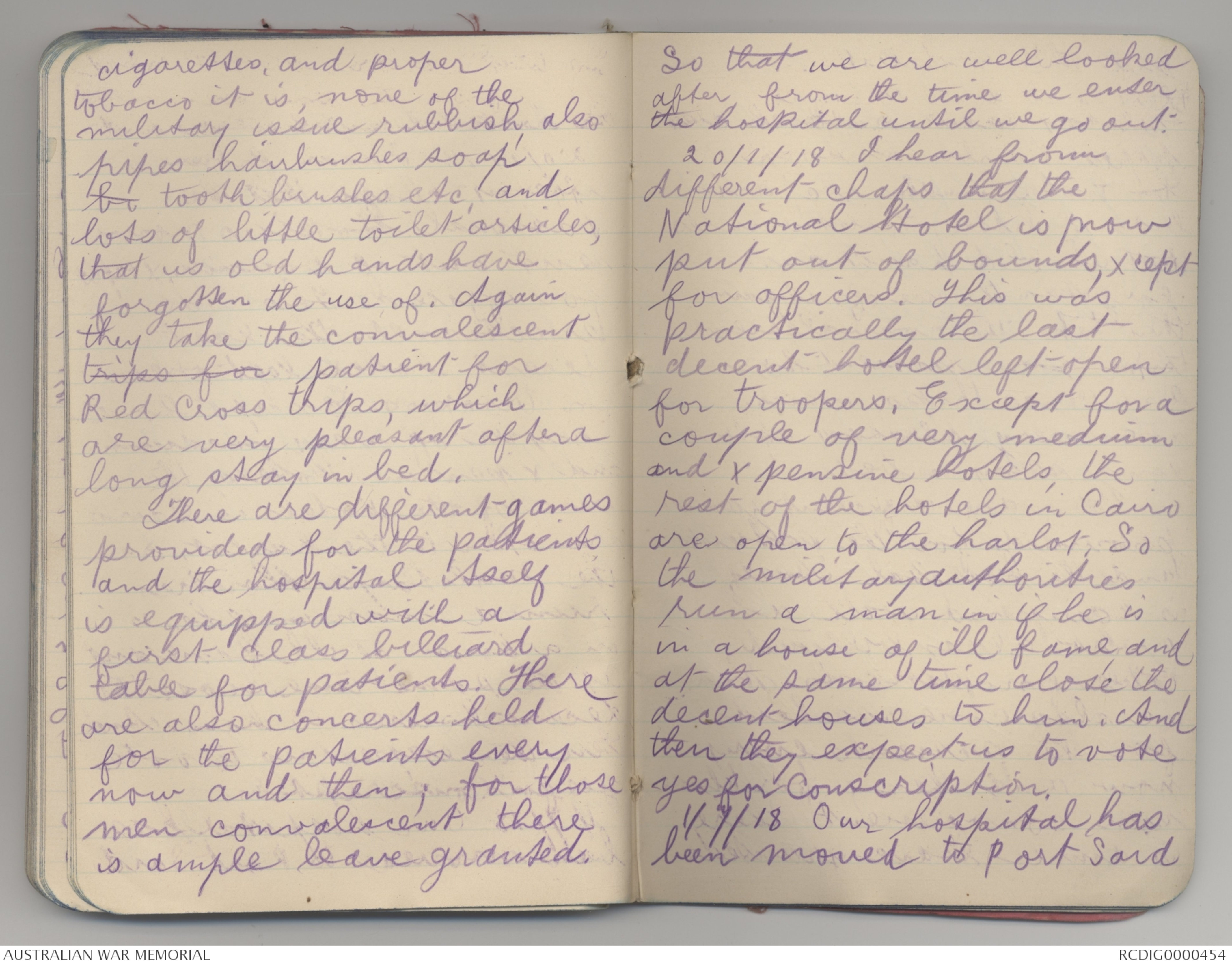
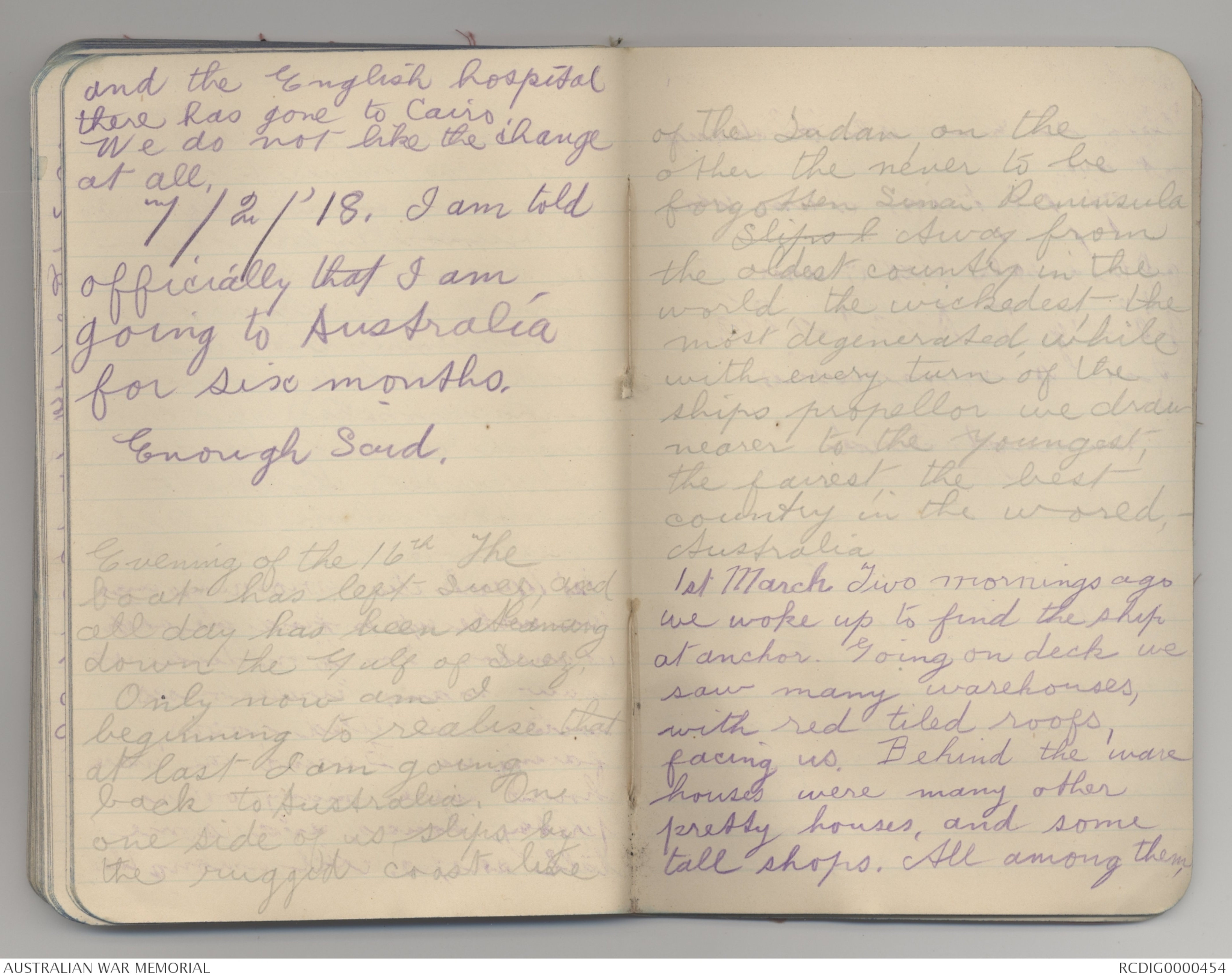
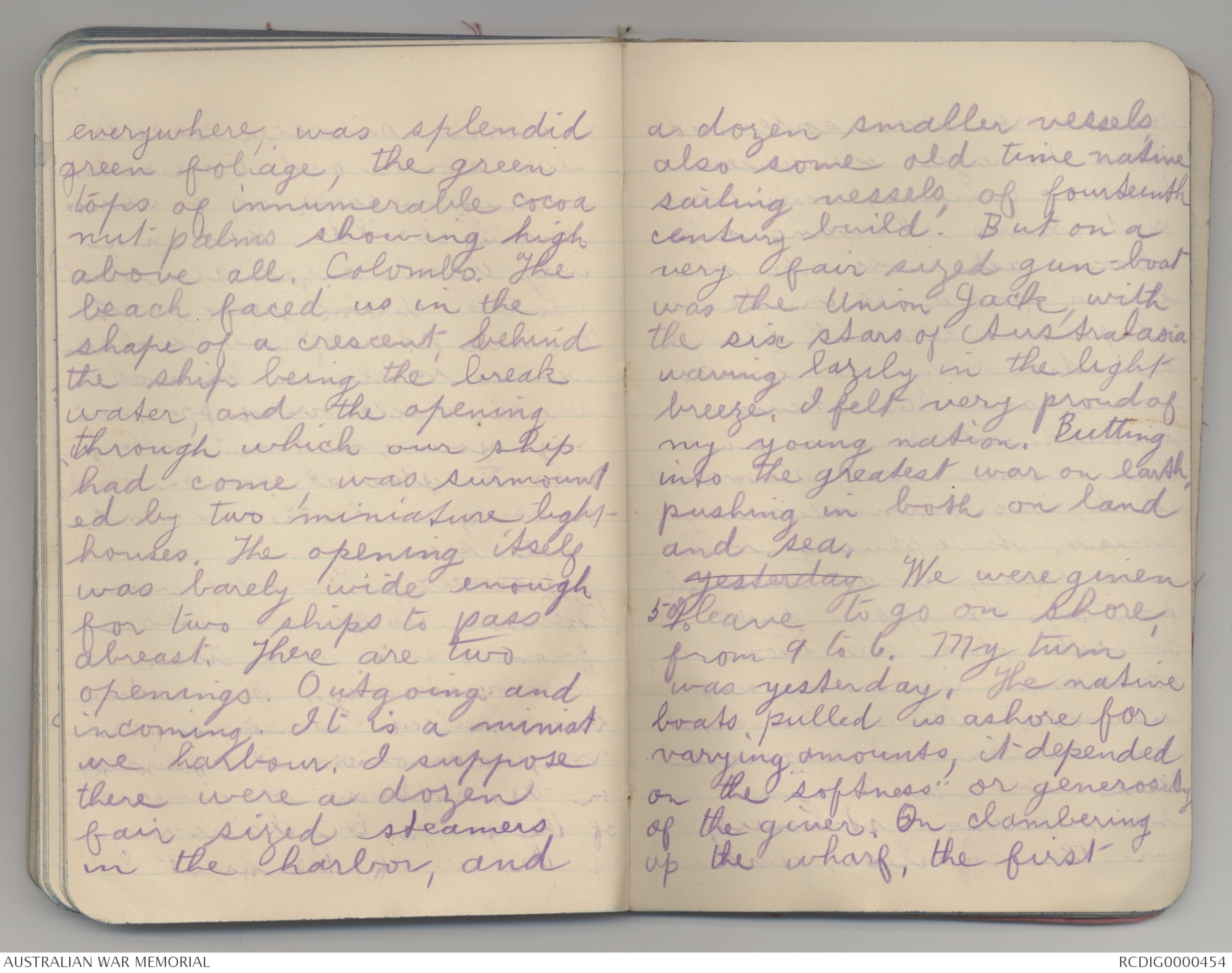
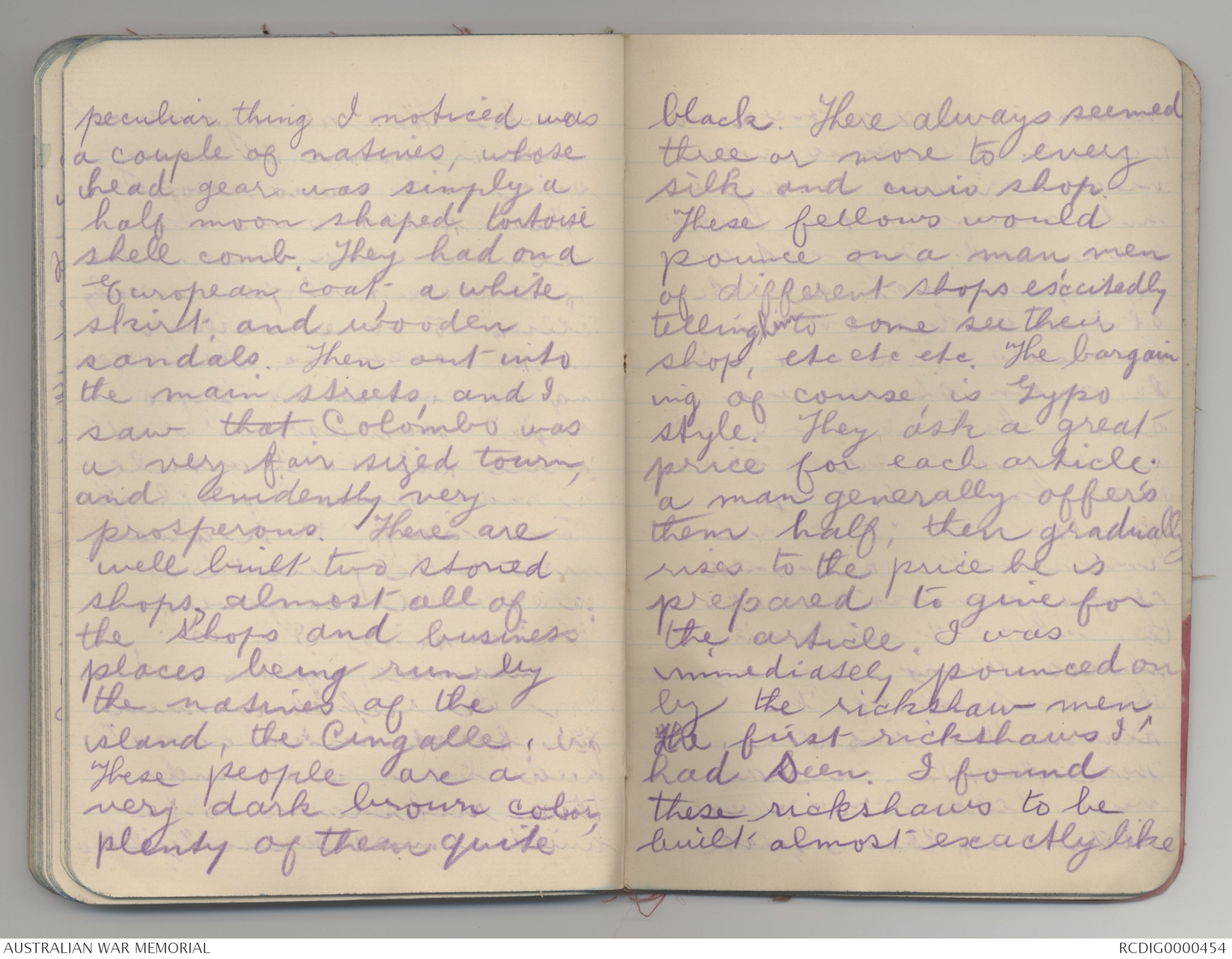
laughter, and I could continually
see figures passing
along the corridors. I found
out from an orderley that
they were convalescent Australians
and New Zealanders from
the form of malarial fever
that was prevalent around
Jaffa. It was a strange
night to me, after so
many nights of campaigning
under the stars in the quiet
nights. In the morning
after breakfast I was put
into another motor ambulance,
in company with some other
poor beggars, and off we went
en route for Ramleh. I could
see now that Jaffa was a
very large town indeed,
containing many fine
houses. But soon the
bumps of the car over the
road soon put all thoughts
of the town out of my head,
and all I could do was to
hang on to the stretcher and
try and ease the bumps as
much as I could. I managed
to turn over on my belly, and
had a better chance, as I
managed to grip the stretcher
with both hands. The other
chaps were in the same
predicament. Luckily none
of us had any bones broken.
My heart went out to the
poor wretches with fractured
limbs who had to make
these journeys. What a long
long painful ride that was.
We were all exhausted
when at last the car pulled
up before some old eastern
building. Here we were
carried up a flight of narrow,
winding stairs, and finally
laid down in a narrow
passage. There was a captured
Turkish doctor here, and
he was dressing some wounded
Turks. There was also a
young native girl, badly hit by
shrapnel, with her evidently
the village doctor, a grey
bearded old man who
attended to the moaning
girls wants, and then crouched
beside her in silence. Here
my wounds were dressed and
dressed splendidly. The
doctor took a great deal of
trouble over me, and I
think it was through his
careful dressings that the
wounds did not go septic
during the long journeys
that were ahead. They gave
us a meal in the big house
then about midday through
the afternoon we pe were
put in motor ambulances,
and the convoy started out
for a distant dressing station.
Soon some of the fellows
began to cry with pain at
the jolting of the cars, but
we could not get the drivers
to go any slower. About
dusk we arrived at a
big field hospital and
thanked God for the finish
of another awful journey,
We were taken out and
placed in rows in a big tent,
and some of the worst
cases had their wounds
dressed. We were given a
meal, but I was too
weak to eat anythingby much by now. Anyway
the meal was only bully beef
and bread and a cup of tea.
I couldn't help thinking as
I lay there how acceptable
a little parcel of gift stuff
from the red cross to each
man would be. A few
chocolates or something
like that. We left the
big English clearing station
next morning, and after
another accursed motor
drive arrived at a clearing
station in the afternoon.
Here an English doctor saw
that that the orderlies gave us
a very fair meal, and
then the doctor came back
with a big armful of
oranges, and the padre
handed round a packet of
cigarettes to each man. How
acceptable those oranges and
cigarettes were. We were very
grateful for them. The
orderlies did everything
they could for us too.
I forget now whether it
was a few hours later or
the next morning that we
were put in the motor
ambulances again, and once
more the journey we had
learned to dread so
much recommenced.
I think that was the last
Journey. I was too far gone
to take count of time or
places then. Anyway one
evening we pulled up
at a big English
clearing station, and were
told that the rest of our
journey would be by train.
We could all have cried
with relief. That night we
were carried into a
Red Crescent train, I
believe one captured by
the Turks. On each side
of the train were three
bunks, like the bunks of
the ship. When at last the
train moved off, and I
found there was no
jolting to give a man
pain, I just closed my
eyes and lay of my right
side in intense relief. It
was the only way I could
lie now. Then the orderley
came round with some
good cocoa and bread
and butter. It was great.
All through the long night
we travelled and pulled
up about seven next morning
at Kantara on the canal,
Under what different circumstances
have I seen this
great base camp. From
the train we were put into
motor ambulances, and
taken to the big tent clearing
station. But what a
difference in these ambulances.
They went very slowly,
as if the drivers were human
beings. At the clearing
station we were well
looked after, and our
wounds dressed. Most
of the wounded went off
that night to Cairo, in the
hospital train. But
myself, with others, were
kept back for twenty four
hours, so that we could
have a good rest and
get some strength back.
Next evening we were
put in the ambulances
again, and were slowly
driven over the pontoon
bridge across the canal,
and on to the railway
station. There we
were carried into the
big red crescent train
and how comfortable
it looked. On either
side of the carriage two
broad bunks, with
white sheets on them.
The orderlies dressed in
white, and there were
even nurses. They gave
us a real good meal, and
cigarettes. Just before the
train started my leg
pained horribly. I
couldn't make out
what was up, but
the truth was the wound
in the thigh had commeced
bleeding, a hemmorhage, For
four awful hours the doctor
made me lie without moving
until we got to Cairo.
Into a motor ambulance
again, and a very
slow drive through the
streets of Cairo, until
at last they brought
me here, and all my
troubles were over. Into a
warm soft bed, the
doctor and night nurse
removed the blood
stained bandages, andhere I rebandaged
the thigh tightly, and
here I am now on
Xmas Eve, very nearly
well again. The nurses
in this ward never tire
of doing everything possible
for a man night and
day, and the doctor is
one of the finest gentlemen
I have ever spoken to in
uniform. The only
trouble is my unreasonable
appetite, which
takes a lot of satisfying
I have been boarded
for Australia, so if my
luck holds good I will
see the dear land
again in the near future.
26th yesterday was Xmas day,
and one of the merriest of the few
Xmas days I've had. The ward
was well decorated up, we had
a grand spread for dinner and
tea, and there was plenty of fun
for those patients who could
hobble about, and plenty of
laughter for those in beds.
It was a great Xmas day.
10/1/'18 The Australian Red
Cross do great work here.
The Red cross ladies come out
from Cairo every day, and
work in the Kitchen here,
cooking all manner of
delicacies for the bed patients,
which are very welcome to
us hungry desert beggars
The foodstuffs they use are all
provided by the Red cross.
Then once every week the
Red cross give us tobacco or
cigarettes; and proper
tobacco it is, none of the
military issue rubbish, also
pipes hairbrushes soapbr tooth brushes etc, and
lots of little toilet articles,
that us old hands have
forgotten the use of. Again
they take the convalescenttrips for patient for
Red Cross trips, which
are very pleasant after a
long stay in bed.
There are different games
provided for the patients
and the hospital itself
is equipped with a
first class billiard
table for patients. There
are also concerts held
for the patients every
now and then; for those
men convalescent there
is ample leave granted.
So that we are well looked
after from the time we enter
the hospital until we go out.
20/1/18 I hear from
different chaps that the
National Hotel is now
put out of bounds, xcept
for officers. This was
practically the last
decent hotel left open
for troopers. Except for a
couple of very medium
and x pensive hotels, the
rest of the hotels in Cairo
are open to the harlot. So
the military authorities
run a man in if he is
in a house of ill fame and
at the same time close the
decent houses to him. And
then they expect us to vote
yes for Conscription.
1/7/18 Our hospital has
been moved to Port Said
and the English hospital
there has gone to Cairo
We do not like the change
at all.
7/2/'18. I am told
officially that I am
going to Australia
for six months.
Enough Said.
Evening of the 16th The
boat has left Suez, and
all day has been steaming
down the Gulf of Suez,
Only now am I
beginning to realise that
at last I am going
back to Australia. On
one side of us slips by
the rugged coast line
of the Sudan, on the
other the never to be
forgotten Sinai PeninsulaSlips Away from
the oldest country in the
world, the wickedest, the
most degenerated, while
with every turn of the
ships propellor we draw
nearer to the youngest,
the fairest, the best
country in the world, -
Australia
1st March Two mornings ago
we woke up to find the ship
at anchor. Going on deck we
saw many warehouses
with red tiled roofs,
facing us. Behind the warehouses
were many other
pretty houses, and some
tall shops. All among them,
everywhere, was splendid
green foliage, the green
tops of innumerable cocoanut
palms showing high
above all. Colombo. The
beach faced us in the
shape of a crescent, behind
the ship being the breakwater,
and the opening
through which our ship
had come, was surmounted
by two miniature lighthouses.
The opening itself
was barely wide enough
for two ships to pass
abreast. There are two
openings. Outgoing and
incoming. It is a miniature
harbour. I suppose
there were a dozen
fair sized steamers
in the harbor, and
a dozen smaller vessels
also some old time native
sailing vessels, of fourteenth
century build. But on a
very fair sized gun-boat
was the Union Jack, with
the six stars of Australasia
waving lazily in the light
breeze. I felt very proud of
my young nation. Butting
into the greatest war on earth
pushing in both on land
and sea.Yesterday. We were given
50% leave to go on shore,
from 9 to 6. My turn
was yesterday. The native
boats pulled us ashore for
varying amounts, it depended
on the "softness" or generosity
of the giver. On clambering
up the wharf, the first
peculiar thing I noticed was
a couple of natives, whose
head gear was simply a
half moon shaped tortoise
shell comb. They had on a
European coat, a white
skirt and wooden
sandals. Then out into
the main streets, and I
saw that Colombo was
a very fair sized town,
and evidently very
prosperous. There are
well built two storied
shops, almost all of
the shops and business
places being run by
the natives of the
island, the Cingalle .
These people, are a
very dark brown color,
plenty of them quite
black. There always seemed
three or more to every
silk and curio shop.
These fellows would
pounce on a man, men
of different shops excitedly
telling him to come see their
shop, etc etc etc. The bargaining
of course is Gypo
style. They ask a great
price for each article;
a man generally offers
them half, then gradually
rises to the price he is
prepared to give for
the article. I was
immediately pounced on
by the rickshaw men,
the first rickshaws I
had Seen. I found
these rickshaws to be
built almost exactly like
 Sandy Mudie
Sandy MudieThis transcription item is now locked to you for editing. To release the lock either Save your changes or Cancel.
This lock will be automatically released after 60 minutes of inactivity.